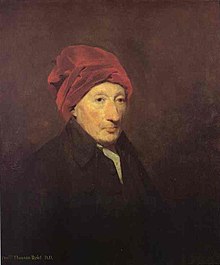Thomas Reid | |
|---|---|
 Reid as painted by Henry Raeburn in 1796 | |
| Born | 26 April 1710 Strachan, Scotland |
| Died | 7 October 1796 (aged 86) Glasgow, Scotland |
| Nationality | Scottish |
| Alma mater | University of Aberdeen |
| Era | 18th-century philosophy |
| Region | Western philosophy |
| School | Scottish common sense realism[1] Scottish Enlightenment Epistemological externalism[2] Direct realism[3] Foundationalism[2][4] Correspondence theory of truth[5] |
| Institutions | University of Glasgow |
Main interests | |
Notable ideas | |

Thomas Reid FRSE (/riːd/; 7 May (O.S. 26 April) 1710[6] – 7 October 1796) was a religiously trained Scottish philosopher best known for his philosophical method, his theory of perception, and its wide implications on epistemology, and as the developer and defender of an agent-causal theory of free will. He also focused extensively on ethics, theory of action, language and philosophy of mind.
He was the founder of the Scottish School of Common Sense and played an integral role in the Scottish Enlightenment. In 1783 he was a joint founder of the Royal Society of Edinburgh. A contemporary of David Hume, Reid was also "Hume's earliest and fiercest critic".[7]
- ^ Selections from the Scottish Philosophy of Common Sense, ed. by G. A. Johnston (1915), essays by Thomas Reid, Adam Ferguson, James Beattie, and Dugald Stewart (online version).
- ^ a b c Rebecca Copenhaver, Todd Buras (eds.), Thomas Reid on Mind, Knowledge, and Value, Oxford University Press, 2015, p. 214.
- ^ Patrick Rysiew, New Essays on Thomas Reid, Routledge, 2017, p. 18.
- ^ Fumerton, Richard (2000). "Foundationalist Theories of Epistemic Justification". Stanford Encyclopedia of Philosophy. Retrieved 19 August 2018.
- ^ M. T. Dalgarno, E. H. Matthews (eds.), The Philosophy of Thomas Reid, Springer, 2012, p. 195.
- ^ "Reid, Thomas". Oxford Dictionary of National Biography (online ed.). Oxford University Press. doi:10.1093/ref:odnb/23342. (Subscription or UK public library membership required.)
- ^ See Craig G. Bartholomew and Michael W. Goheen, Christian Philosophy p. 138 (Baker Academic, 2013).